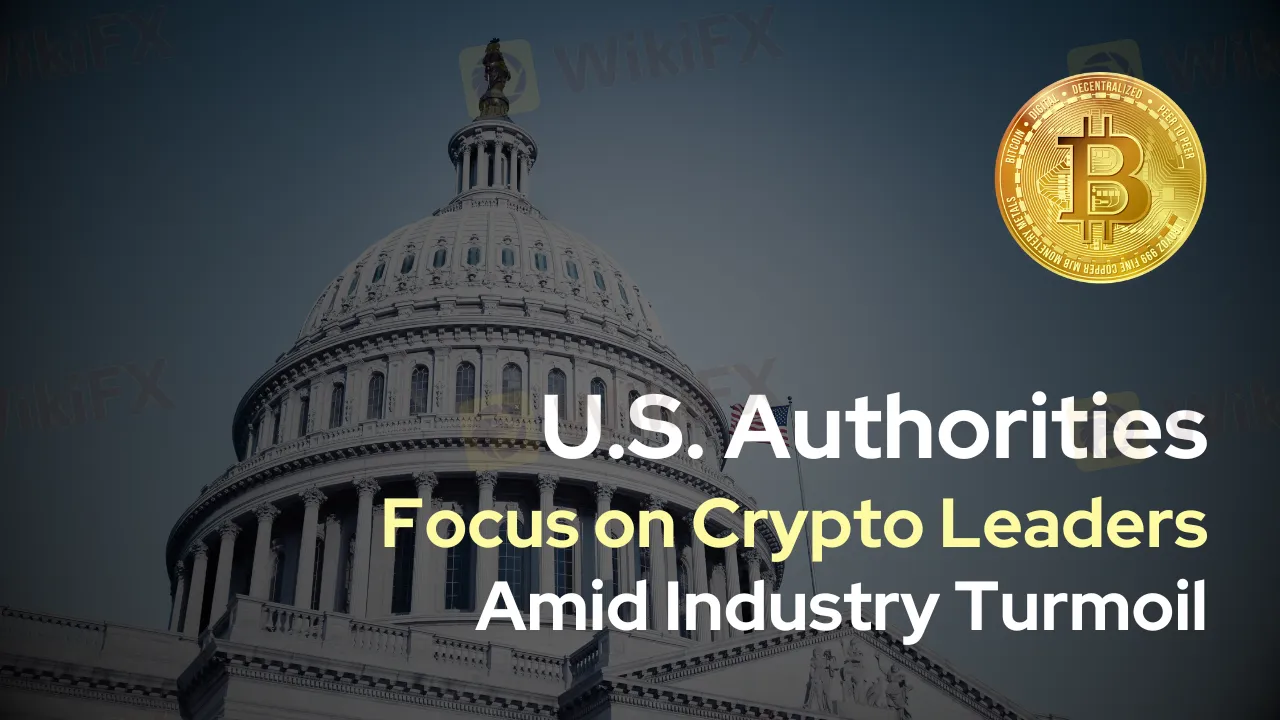简体中文
繁體中文
English
Pусский
日本語
ภาษาไทย
Tiếng Việt
Bahasa Indonesia
Español
हिन्दी
Filippiiniläinen
Français
Deutsch
Português
Türkçe
한국어
العربية
U.S. Authorities Focus on Crypto Leaders Amid Industry Turmoil
Abstract:U.S. authorities are scrutinizing top crypto bosses for alleged fraud and illegal operations amidst industry downturn, with key figures from Binance, Terraform Labs, Celsius, Digital Currency Group, Voyager Digital, and Tron Foundation facing legal challenges.

WASHINGTON — Following the conviction of former cryptocurrency figurehead Sam Bankman-Fried for defrauding customers, U.S. regulatory and law enforcement agencies are turning their attention to other prominent figures in the cryptocurrency industry. These developments come in the wake of last year's dramatic downturn in token prices, which led to high-profile business collapses and increased regulatory scrutiny.
Sam Bankman-Fried

Among those facing legal challenges are Changpeng “CZ” Zhao, CEO of Binance; Do Kwon, co-founder of Terraform Labs; Alex Mashinsky, founder of the Celsius Network; Barry Silbert, head of Digital Currency Group; Stephen Ehrlich of Voyager Digital; and Justin Sun, founder of the Tron Foundation. Each has faced various allegations from U.S. authorities, ranging from fraud to operating illegal exchanges.
Changpeng “CZ” Zhao

Changpeng Zhao's Binance, a global cryptocurrency exchange, has been hit with lawsuits by both the SEC and CFTC, accusing the company and its CEO of deceptive practices and sham compliance. Zhao has firmly denied these allegations, expressing disappointment in the regulatory actions and defending the integrity of his exchange.
Do Kwon

Do Kwon, whose TerraUSD and Luna tokens once boasted a market valuation exceeding $40 billion, is now contending with fraud charges in the U.S. and was recently arrested in Montenegro on separate allegations of document forgery. Kwon has refuted the claims, and Terraform Labs has contested the SEC's accusations in court filings.
Alex Mashinsky

Alex Mashinsky, associated with the now-bankrupt Celsius Network, has pled not guilty to U.S. fraud charges and faces additional legal battles with state and federal agencies, including the SEC, CFTC, and FTC. These agencies allege that he misled customers about the safety and value of the company's assets while engaging in increasingly risky management practices.
Barry Silbert

Barry Silbert's Digital Currency Group is under fire as well, with its subsidiary Genesis Global Capital having filed for bankruptcy earlier this year. The New York Attorney General has accused Silbert and his firms of customer fraud amounting to over $1 billion, a claim Silbert is prepared to challenge in court.
Stephen Ehrlich

Stephen Ehrlich's firm, Voyager Digital, is yet another entity that suffered in the recent crypto crash. He is accused by the CFTC and FTC of deceiving customers about the security of their investments and is pushing back against claims that he was responsible for the company's risky behavior and subsequent failure.
Justin Sun

Finally, Justin Sun is facing SEC charges over fraudulent activities related to his companies' crypto tokens. The SEC alleges that Sun artificially inflated trading volumes and secretly paid celebrities to endorse the tokens, charges that represent the latest in regulatory crackdowns on crypto promotion practices.
While the aforementioned executives have all denied any wrongdoing, their legal predicaments underscore the heightened vigilance of U.S. authorities as they work to oversee the tumultuous cryptocurrency market. The industry is being closely watched as regulators seek to protect consumers and ensure the integrity of financial systems amidst the evolving landscape of digital currencies.
Bottom line
The cryptocurrency market faces a period of intense regulatory scrutiny and legal challenges, several of its most notable figures are finding themselves in the crosshairs of U.S. authorities. With charges ranging from fraud to operating illegal businesses, the legal outcomes of these cases could significantly impact the future regulatory landscape for digital currencies.

Disclaimer:
The views in this article only represent the author's personal views, and do not constitute investment advice on this platform. This platform does not guarantee the accuracy, completeness and timeliness of the information in the article, and will not be liable for any loss caused by the use of or reliance on the information in the article.
Read more

Georgia Man Charged in Danbury Kidnapping and Crypto Extortion Plot
Georgia man James Schwab charged in Danbury kidnapping tied to $230M crypto heist. Plot targeted couple for ransom after Miami altercation with son.

Bybit Shuts Down NFT Marketplace Amid Crypto Market Downturn
Bybit announces the closure of its NFT marketplace, citing efforts to streamline offerings. Discover the latest trends in the declining NFT market and its shift to utility-based growth.

Galaxy Digital Settles $200M in Luna Token Manipulation Case
Galaxy Digital pays $200M to settle Luna token manipulation probe by NY regulators, linked to TerraUSD’s 2022 crash, impacting crypto market stability.

April Forex Trends: EUR/USD, GBP/USD, USD/JPY, AUD/USD, USD/CAD Insights
Know April’s forex seasonality trends for EUR/USD, GBP/USD, USD/JPY, AUD/USD, and USD/CAD. Historical insights and key levels to watch in 2025.
WikiFX Broker
Latest News
The Withdrawal Trap: How Scam Brokers Lure Victims into Paying More
FCA to Investors: Think Twice Before Trusting These Brokers
Trump\s tariffs: How could they affect the UK and your money
Trump gambles it all on global tariffs he\s wanted for decades
TradingView Brings Live Market Charts to Telegram Users with New Mini App
Trump tariffs: How will India navigate a world on the brink of a trade war?
IG Group Acquires Freetrade for £160M to Expand UK Investment Market
U.S. March ISM Manufacturing PMI Released
Should You Beware of Forex Trading Gurus?
Exposed by SC: The Latest Investment Scams Targeting Malaysian Investors
Currency Calculator







